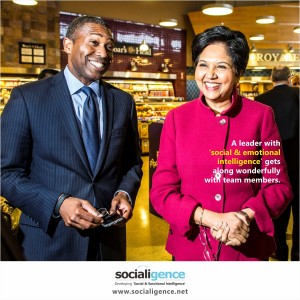
Why do people work? – For money…position…respect…challenges? And why do they leave companies? – For more money…better position…higher respect…greater challenges?
While it is convenient to attribute people’s behavior at workplace to these tangible factors, fact is that once basic needs are met, Why do people work? – For money…position…respect…challenges? And why do they leave companies? – For more money…better position…higher respect…greater challenges?
While it is convenient to attribute people’s behavior at workplace to these tangible factors, fact is that once basic needs are met, people work to ‘feel good’.The chasefor money, position, respect or challenges is also only an effort to feel good.Even their decision to changejob/company is largely driven by this ‘emotional reason’.
In fact reverse is also true – “when people don’t feel good, they don’t work well”. Researchers have consistently found strong correlation between emotional states and productivity at workplace.
Then there are important changes taking place in the psychology of the ‘new professional’. As author Daniel Pink suggested in his landmark book ‘Drive’, now the motivating factors for new highly skilled professionals are internal – viz.autonomy, mastery and purpose.
But where does all this put leadership in the scheme of things?In the changed scenario, leader’s role has become less of supervising and more of facilitating.In many ways, she is now atone-setter, a mood-regulator or an emotion-modulator.
That makes a strong case for leaders to have ‘Social & Emotional Intelligence’ in their repertoire of interpersonal skills. It is the “Ability to adapt one’s behavior on the basis of awareness of one’s own emotions and attunement with others’ emotions”.
people work to ‘feel good’.The chasefor money, position, respect or challenges is also only an effort to feel good.Even their decision to changejob/company is largely driven by this ‘emotional reason’.
In fact reverse is also true – “when people don’t feel good, they don’t work well”. Researchers have consistently found strong correlation between emotional states and productivity at workplace.
Then there are important changes taking place in the psychology of the ‘new professional’. As author Daniel Pink suggested in his landmark book ‘Drive’, now the motivating factors for new highly skilled professionals are internal – viz.autonomy, mastery and purpose.
But where does all this put leadership in the scheme of things?In the changed scenario, leader’s role has become less of supervising and more of facilitating.In many ways, she is now atone-setter, a mood-regulator or an emotion-modulator.
That makes a strong case for leaders to have ‘Social & Emotional Intelligence’ in their repertoire of interpersonal skills. It is the “Ability to adapt one’s behavior on the basis of awareness of one’s own emotions and attunement with others’ emotions”.

This skill leverages the concepts of neuroscience and psychology for spotting emotions of self and others by observing nonverbal behavior – both autonomic signals and external body language – and then to ‘personalize and customize’behavior wisely.
As one of the Top-10 Future Work Skills according to The Institute for the Future (IFTF), this combination of social intelligence andemotional intelligence helps a leader in:
- Creating the right emotional ecosystem
- Leveraging the individual strengths
- Championing diversity synergistically
- Personalizing the empathic motivation
In all, ‘Social & Emotional Intelligence’ fosters connection, which furthers engagement, which in turn increases productivity – hencehelpinga leaderinfulfilling her role holistically.
Dr. Sandeep Atre (Founder-Director, Socialigence)
